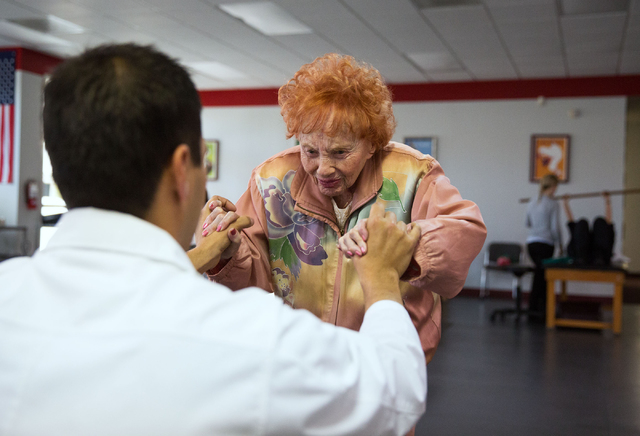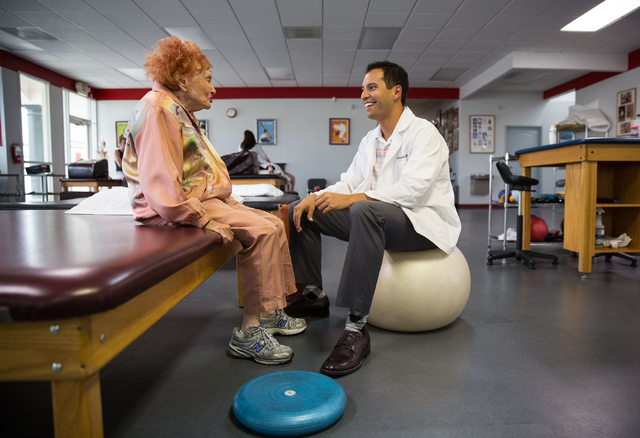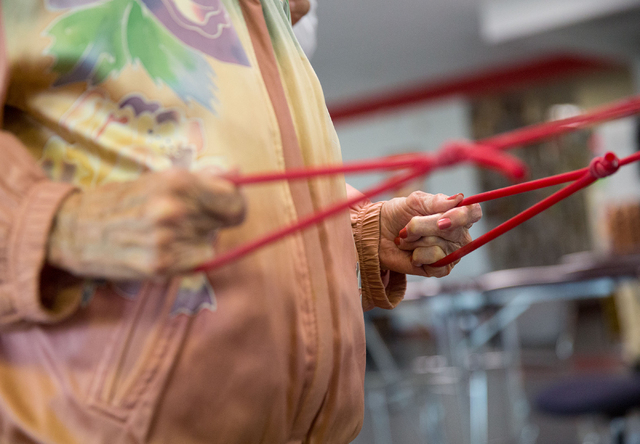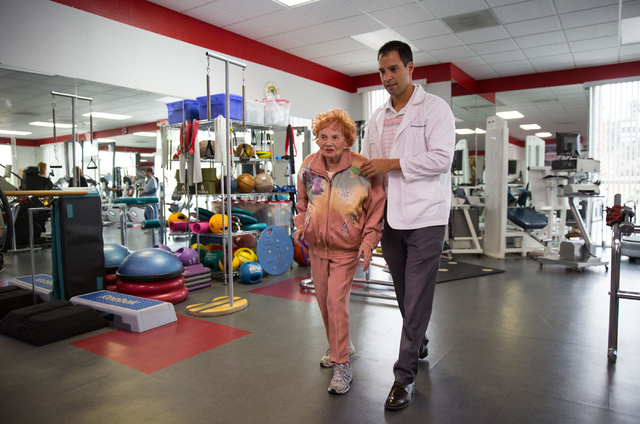95-year-old looks to inspire seniors to stay active
She’s barely 100 pounds, has seen 95 birthdays and can’t be missed with her fire red hair and the sparkle in her eyes. Sylvia Duboys, a widow, is a shining example of today’s senior citizen.
“Do you know how old I am?” she asked, then looked to her daughter, Wendy Wiener, for help. “Am I 100 yet?”
Fiercely independent, Duboys lived on her own until last year. She’d still be on her own if she had her way, but six years ago, she fell and broke her right hip. Even then, she implored Wiener, a real estate broker in Las Vegas, to let her stay in her Boca Raton, Fla., condo to recover.
Wiener relented only because Duboys had daily nursing care. Still, Wiener flew to Florida for a week every month to help look after her.
“My mother did a smart thing a long time ago,” Wiener said. “She got long-term care insurance. … It allowed her to have someone there all the time, even at night, because if you get up out of bed and you fall, it’s all over.”
Now living with her daughter in Las Vegas, Duboys spends her time knitting and sewing and doing Japanese bunka paintings. She also reads a lot.
“We’re always getting books from the library,” Wiener said. “Right now, she’s reading ‘The Good Earth’ by Pearl Buck. If she loses her page, she starts the book all over. I think she’s reread the beginning three times so far.”
Duboys uses a walker on bad days but prefers to walk on her own.
“I’m doing well, but I’d like to do more,” she said and expressed a desire to read to elementary schoolchildren.
That desire to stay active and help others was evident even when she was 50. That’s when she returned to school to earn her master’s degree, driving 80 miles each way to a state college so she could become a substitute teacher.
Duboys said she’d consistently taken good care of herself throughout her life, eating the right foods and enjoying walks that spanned miles at a time.
“I’ve always exercised,” she said. “Never give it up. You can do exercises for different ages. … I never let anything stop me.”
This day, she was at the Keith Kleven Institute, 3820 S. Jones Blvd. That broken hip didn’t repair well, and she had to undergo a second surgery within a couple of months of the first. Her body is still not at its peak, Wiener said.
Anthony Tabor, a doctor of physical therapy, put her through her paces — pedaling a stationary bike, kicking a ball, pushing him as he sat in a wheeled office chair and balancing on a plastic dome. Her eyes lit up with each success.
“Did you see me? I was pushing him,” Duboys said.
Medicare covers the cost of the rehabilitation. About 30 to 40 percent of patients there are on Medicare.
“You’ve got to make it fun, but you also need to keep them moving,” Tabor said.
Some are unaware how much coverage it provides or what their Medicare cap is, Tabor said.
He said anyone with multiple injuries or multiple issues would likely need more rehabilitation than is usually provided by Medicare, so he has some patients stop rehabilitation sessions and just assigns them home exercises.
“It breaks my heart to know that it’s so early on in the year that I have to discontinue treatment just to save that (remainder) for a little while until the end of the year, so if something does happen that requires (rehab to resume). … You want to save that chunk for something medically necessary,” he said.
Duboys said she almost didn’t get a chance to take rehabilitation.
“They weren’t going to take me on,” she said of the institute. “Then they decided to because they saw that I was serious about it.”
Wiener said the physical therapy was doing wonders, allowing her mother to stand without assistance and attain better balance to help ensure she didn’t fall again. She’s there once a week for a 45-minute session. When Medicare coverage runs out, she said she would pay for her mother to continue.
Wiener said she was surprised to hear that Medicare covered physical therapy sessions “because they don’t cover hearing aids, but they cover her for going to the foot doctor but not the dentist.”
Wiener said the most important thing to her was that her mother be strong enough to never fell again.
“Her balance, I want her to (have her) balance because you can never leave her alone,” she said.
Tabor said it was important for elderly people to eat right and stay active. How does that help recovery when they have a setback?
“It makes it much easier for the body to repair itself,” he said. “It’s harder to absorb nutrients as we age, so it’s even more important (to eat right) and exercise. Cardiovascular-wise, (you want to) exercise 20 or 30 minutes, and strength training is vital.
“We’ve all seen the little old man all hunched over. We want to prevent that. When you keep your muscles working, it makes you better off.”
Duboys still makes physical exercises part of her day. At Wiener’s home in The Lakes, she has resistance bands that she hooks around furniture.
“I wasn’t going to do this (interview), but then she said it could help people,” Duboys said. “If they see I can do it, maybe they’ll do it, too.”
Contact Summerlin/Summerlin South View reporter Jan Hogan at jhogan@viewnews.com or 702-387-2949.































